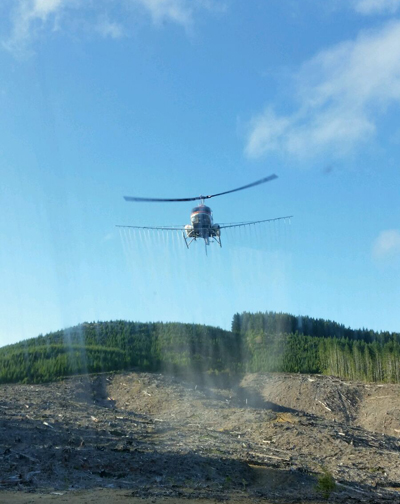
"Since 2010, state and federal agencies awarded Applebee Aviation more than $1 million in contracts to apply fertilizer and pesticides on public land in Oregon and Washington.4 During that same span, Applebee Aviation tallied more complaints, violations and vehicle crashes than any other aerial pesticide operator in Oregon, according to state and federal records.
Complaints are not rare for companies in the business of spraying chemicals on Oregon forestland, which is both highly visible and controversial. Many licensed operators have at least one complaint against them, according to Oregon Department of Agriculture data.
Applebee Aviation has 15, more than any other aerial pesticide operator in the state.
Applebee also has been cited for violations in four different cases in Oregon and one in Washington since 2010. In those cases, Applebee Aviation staff failed to review pesticide labels before applying them, allowed chemicals to drift onto a bicyclist and sprayed a weed killer toxic to fish over a creek where salmon and steelhead spawn. Two other cases are pending.

Also during the past six years, Applebee Aviation has been involved in three crashes, according to FAA data. One was fatal.7
Meanwhile, Applebee Aviation has won nearly $1 million in bids for aerial herbicide spraying from the Washington Department of Natural Resources over the past six years.8 In 2015, the company won two contracts from the Oregon Department of Forestry, totaling near $50,000.9
Kevin Vanderlei, a former Applebee Aviation truck driver and pesticide handler, claims he was exposed to pesticides during jobs on DNR land. He recalls refilling a helicopter with broken nozzles, which caused pesticides to drip on him.
“I’m not talking about an occasional drip,” he said. “I’m talking about being doused in chemical every time I had to fill the helicopter.”"
Read More:
BLM Investigates After Company Sprays Pesticide On Public Land Without License . News | OPB







